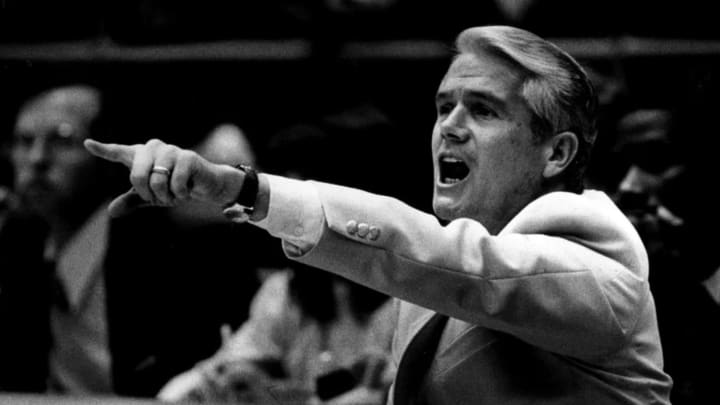Lee Rose, Coach of Purdue's Last Final Four Team in 1980, Passed Away on Tuesday

Lee Rose wasn't the basketball coach at Purdue for very long, but he did something he's predecessors never did — he took the Boilermakers to the Final Four.
Rose, who coached two seasons at Purdue from 1978 through 1980, died on Tuesday in Charlotte, N.C. He was 85.
Rose was diagnosed with Alzheimer’s disease in 2015, and the last several years of his life were difficult as his memory and thinking skills started to fade. In a fall sometime after his diagnosis, he broke his femur and suffered spinal cord damage, which left Rose in a wheelchair in his final years. He and his wife Eleanor were married for 63 years.
Rose was well respected as a brilliant basketball technician. Prior to coming to Purdue, the Kentucky native took little Charlotte to the Final Four in 1977. Led by future NBA star Cedric ''Cornbread'' Maxwell, he upset No. 5 Syracuse and No. 1 seed Michigan in the regionals and then lost to Marquette on a controversial call in the national semifinals. Rose went 72-18 at Charlotte and was the 1977 National Coach of the Year. He lost only two home games in three years there, going 40-2 in Charlotte.
Kevin King was a forward on the 1977 Final Four team for Charlotte. From New Jersey, King was also the first player Rose signed to a scholarship in 1974. “We called Coach Rose ‘The Silver Fox,’ ” King said. “His demeanor was serious, but he could also relate to the players,'' Kevin King, a forward on Rose's 1977 Charlotte team, told the Charlotte Observer. "One thing I loved about him was how great a situational coach he was. If things weren’t going right, he’d come up with something real quick and draw it up on the sideline. We’d run it for the first time ever right then, and it would work. He was so good at adjusting. The run we made to the NIT final and then to the Final Four the next year — so much of that was due to him.”
Rose stayed one more year in Charlotte after the Final Four run before leaving for Purdue, where he replaced Fred Schaus. He had a 50-18 record in his two years at Purdue, taking the 1980 team led by 7-foot center Joe Barry Carroll, to the Final Four.
That season was memorable for many reasons. It was just Purdue's second trip to the Final Four — they haven't been back since — and getting there was half the fun. Purdue beat Indiana 76-67 in the NCAA Tournament regional semifinals in Lexington, Ky, — not far from Rose's boyhood home. — and then beat Duke to advance to the Final Four. It was the only time Indiana and Purdue have played in the NCAA Tournament.
Rose's first team at Purdue in 1979 finished in a three-way tie for the Big Ten regular season championship with Michigan State and Iowa. The Boilermakers didn't get a bid to the NCAA Tournament — the Spartans did, and with Magic Johnson, won the 1979 national championship — and settled for the NIT. They made it all the way to the finals, where they lost to Indiana 53-52 in New York.
In the 1979-80 season, Rose went 23-10 and finished third in the Big Ten, but the Boilermakers got hot late and made that electrifying postseason run all the way to the Final Four in Indianapolis. Purdue lost to UCLA in the national semifinals.
Rose was never comfortable at Purdue, sparring often with athletic director George King over things he felt his basketball program needed. (They all came soon after he left.) He also was frustrated often by all of the publicity that fellow coaches Bob Knight (Indiana) and Digger Phelps (Notre Dame) got in the state and felt that Purdue did not get the recognition it deserved, even with its own borders.
During a 2015 interview with me for my book "Missing Banners,'' Rose talked openly about his relationship with Knight, and always had great respect for the man and how he treated Rose.
“During my entire time at Purdue, I never had a cross word with Knight. Not one,’’ Rose said in the 2015 interview. “When I took the Purdue job, I didn’t really know any of the Big Ten coaches. I had heard there had been some problems between the two schools, but when I first saw Coach Knight at the Big Ten coaches meeting, I went up to him and we talked. I said to him ‘I don’t know about what’s gone on before, but you’re not going to have any problems with me. And he said to me ‘You’ve just done something no one else has ever done.’
“It was a nice exchange and we never did have a single issue. I respected the heck out of him as a coach and really enjoyed competing against him.’’
They squared off six times in two years, each winning three games. He was replaced by Gene Keady.
After that Final Four, Rose left to take over a fledgling program at the University of South Florida in Tampa. That school had just built a new on-campus arena and wanted make a big hiring splash, and did just that with Rose. He spent six seasons there and went 106-69, taking them to three NIT tournaments.
Rose left USF for the NBA, working as an assistant in San Antonio, New Jersey, Milwaukee and Charlotte before retiring in 2008.
Among Rose’s survivors are his wife Eleanor, his two sons, Mike and Mark, and his four grandchildren. A celebration of Rose’s life will be held at an undetermined date, likely in the early fall before the next basketball season begins.
According to the Charlotte Obersver, the family is establishing the Coach Lee Rose Foundation, which will have a mission of helping kids through sports, with coaching, training, equipment and academic scholarships. Contributions can be mailed to the Coach Lee Rose Foundation in care of Mike Rose, 3041 Stoneybrook Road, Charlotte NC, 28205.
